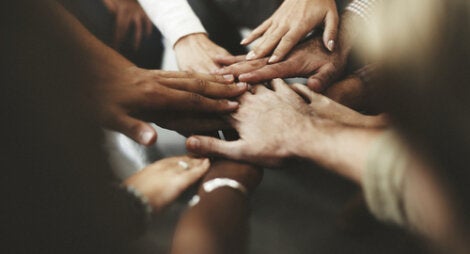The Importance of Peaceful Coexistence


Written and verified by the psychologist Valeria Sabater
Coexistence is the pillar that sustains many aspects of human life. As highly sociable creatures, achieving a peaceful, effective, and harmonious coexistence not only helps to guarantee our survival as a group, but also helps to promote well-being and progress.
Psychiatrist Enrique Rojas indicates that coexistence is essentially the art of knowing how to share and participating in the lives of others, while allowing them to become involved in our own existence. As we know all too well, this is almost never as easy as it sounds. If it’s difficult for members of the same family to live together in peace at times, it isn’t difficult to understand just how challenging coexistence can be on an international and global level.
It takes more than a few agreements, fine words, and peace treaties to ensure harmonious coexistence on a global scale. Beyond all that, it requires human commitment and willpower. In that, we all have an important part to play. After all, great revolutions aren’t achieved by moving mountains, but by shifting the rocks those mountains are made of.
Real change is often silent, occurring in small and significant ways each and every day. This is where each of us can get involved.

The pillars of coexistence
In his theory of moral development, American psychologist Lawrence Kohlberg points out that the most important stage for any child occurs at the age of 10, with what’s known as the autonomous stage. This is the moment when we realize that, when you look beyond societal norms, you find human needs. Only then do we become aware of the value of individual actions, altruism, and compassion.
Coexistence isn’t solely based on the need to respect and live in peace with one another. In fact, it goes far beyond that. Achieving peaceful coexistence requires a certain level of commitment, proactivity, and hard work, in every aspect of our day-to-day lives. Not just the great nations must learn to live in harmony in order to reduce conflicts and differences.
Knowing how to live together peacefully is the backbone of every aspect of human life. It’s at the core of any romantic relationship, allowing couples to live together, start a family together, and raise children together. Peaceful coexistence is essential for any community, club, workplace, or any other setting where we come into contact with other people.
If we want to achieve this, we each have the responsibility to get to know and understand one another and see ourselves reflected in those around us. This social dynamic helps to promote empathy, emotions, and tolerance.
Let’s take a look at some of the other essential components.
Rejecting violence in all its forms
Each year on May 16th, we celebrate the International Day of Living Together in Peace. It’s the ideal moment to reflect on the different ways in which each and every one of us can contribute to this goal.
One aspect that requires particular attention is the commitment to non-violence. While it’s undoubtedly its most obvious and tangible form, it’s important to understand that “violence” doesn’t just mean physical aggression.
- One example might be knowing how to talk to one another with respect, and without resorting to aggressive forms of communication.
- Being capable of understanding without discrimination and accepting differences rather than attacking, criticizing, or dismissing them.
- Gandhi spoke in great length about the art of non-violence, showing that it’s the only way to promote harmonious existence between individuals and nations.

Compassion and solidarity
Coexistence will never be possible if we can’t learn to appreciate one another and accept that other people, like us, have their own opinions, origins, values, and needs. We’re all different, yet equal. We’re all worthy of appreciation, respect, and the chance to build the life we want.
In order to achieve this, we must work to create a greater sense of solidarity and compassion.
Coexistence and the importance of moving forward together in pursuit of the same goals
Throughout history, humans have had to work together in order to continue coexisting in an ever-changing world, full of uncertainties and new threats. This is how we’ve survived as a species, and how we’ll continue to overcome periods of great hardship.
If we want to achieve this lofty goal, it’s essential for us to put aside our differences, selfishness, and personal interests.
Caring for our planet
It’s almost impossible to talk about the importance of coexistence without considering a little bit of context: our planet. The Earth gives us a home, making it possible for each and every one of us to be here. We all understand the importance of addressing aspects such as peace, social equality, non-discrimination, and shunning violence in all its forms.
But one final aspect that can’t be ignored, especially now, is the need to tend to, care for, and protect the Earth and each of its many ecosystems. If life is balance, and balance can only be achieved when we know how to live together in harmony, then we also need to learn how to take better care of the home that’s sheltered us for millennia, both for our sake and for the sake of generations to come.
Each of us must take time to reflect on these key components. It’s important to understand that coexistence ultimately begins at home, with the people closest to us. We all have a part to play in the social, emotional, and existential tapestry that is human coexistence.
This text is provided for informational purposes only and does not replace consultation with a professional. If in doubt, consult your specialist.








